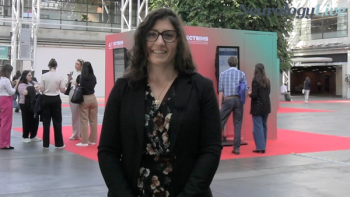
A duo of experts discussed the importance of addressing barriers such as provider comfort, access to genetic counselors, and insurance coverage to reduce diagnostic latency and standardize genetic testing for epilepsy. [WATCH TIME: 5 minutes]

Isabella Ciccone, Content Associate, NeurologyLive®, has been with the team since September 2022. Follow her on X @iciccone7 or email her at [email protected]

A duo of experts discussed the importance of addressing barriers such as provider comfort, access to genetic counselors, and insurance coverage to reduce diagnostic latency and standardize genetic testing for epilepsy. [WATCH TIME: 5 minutes]

The William S. and Lois Stiles Edgerly Professor of Neurology at Yale School of Medicine talked about refining multiple sclerosis in line with the updated diagnostic criteria. [WATCH TIME: 5 minutes]

Early initiation of combined low‐dose rituximab therapy showed better improvements of chronic inflammatory demyelinating polyradiculoneuropathy in a short‐term than delayed initiation.

Previously, Argenx's efgartigimod alfa and hyaluronidase-qvfc was granted orphan drug designation for the treatment of chronic inflammatory demyelinating polyneuropathy in Japan.

Pediatric epilepsy specialists Adam Numis, MD, and Laura Kirkpatrick, MD, highlighted efforts to standardize data collection for pediatric epilepsy health equity and improve neonatal epilepsy outcomes.

Recent findings from an analysis showed that sodium oxybate significantly reduced narcolepsy symptoms, including cataplexy and excessive daytime sleepiness, among patients with the sleep disorder.

In a recent survey, key factors associated with perceived support included knowing someone who had the same diagnosis of their sleep disorder, younger age, and marital status.

Jessica Nickrand, PhD, and Allyson Eyermann from the Child Neurology Foundation emphasized the importance of multidisciplinary collaboration for children with epilepsy and their families.

At ECTRIMS 2024, the postdoctoral research assistant at Charité University Berlin discussed how the updated diagnostic criteria aim to address gaps in diagnosing and treating overlapping autoimmune conditions. [WATCH TIME: 4 minutes]

The professor of neurology at University of Florence talked about how early intervention, broader assessment tools, and personalized approaches are essential for effectively managing multiple sclerosis. [WATCH TIME: 4 minutes]

Take a look at some of the most-anticipated FDA pending approvals expected in 2025 that researchers and clinicians in neurology should keep an eye out on.

The professor of neurology at NYU Grossman School of Medicine talked about using responsive neurostimulators to seek shortened drug evaluation timelines and enhance epilepsy treatment.

The assistant professor at The Hebrew University of Jerusalem School of Pharmacy discussed how the brain microbiome may contribute to Alzheimer through interactions with immune responses and proteins. [WATCH TIME: 5 minutes]

A 51-year-old patient with neuromyelitis optica spectrum disorder and hemorrhagic longitudinally extensive transverse myelitis presented a challenging case.

At ECTRIMS 2024, the assistant professor at the University of Naples the latest multiple sclerosis diagnostic criteria, which emphasized a shift toward biologically based diagnoses. [WATCH TIME: 4 minutes]

A new study highlighted the importance of initiating immunotherapy promptly in chronic inflammatory demyelinating polyneuropathy to prevent axonal damage and disability progression.

At the 2024 ECTRIMS Congress, the neurologist at the University Hospital Center of Nice talked about how the decision to treat patients at risk of MS is highly individualized. [WATCH TIME: 3 minutes]

A study highlighted corneal confocal microscopy as a promising noninvasive tool for tracking sensory nerve damage in chronic inflammatory demyelinating polyradiculoneuropathy.

At ECTRIMS 2024, the consultant neurologist at Queen's Square MS Center in London talked about the evolving McDonald criteria to define multiple sclerosis biologically. [WATCH TIME: 5 minutes]

A new study suggests particulate matter exposure exacerbated the severity of multiple sclerosis and neuromyelitis optica spectrum disorder, with significant clinical and radiological impacts.

At ECTRIMS 2024, the postdoctoral researcher at Amsterdam University Medical Center talked about an evolving tool developed to predict disease progression in multiple sclerosis. [WATCH TIME: 7 minutes]

The company announced the completion of its phase 2 study assessing SPG601 in adult men with FXS, with topline findings expected to be reported by end of the first quarter in 2025.

The neurology resident at the University Hospital Frankfurt in Germany talked about the importance of initiating treatment early for patients with multiple sclerosis to improve long-term outcomes. [WATCH TIME: 6 minutes]

The associate professor of neurology at Harvard Medical School talked about reconsidering therapy switches for NMOSD, incorporating safety failures like recurrent infections, and prioritizing real-world studies to validate findings. [WATCH TIME: 5 minutes]

The professor in the department of diagnostic radiology at City of Hope talked about using amyloid and tau PET imaging for diagnostic clarity in Alzheimer disease, particularly in complex and atypical patient presentations. [WATCH TIME: 10 minutes]

The chief of neuroinfectious diseases and global neurology at Northwestern Medicine discussed a recently published study that highlighted Long COVID’s significant clinical and societal impact. [WATCH TIME: 5 minutes]

The founding director of the Optimal Aging Institute at the NYU Grossman School of Medicine talked about a recent study that estimated the lifetime risk of dementia and its implications for prevention, care, as well as societal planning. [WATCH TIME: 5 minutes]

Recent research investigated how HSV-1 infection affects tau phosphorylation through the cGAS-STING-TBK1 pathway, highlighting potential new therapeutic strategies for Alzheimer disease.

A duo of experts from NYU Grossman School of Medicine talked about a new study that identified deficiencies in acetyl-L-carnitine and free carnitine as potential blood biomarkers for Alzheimer disease. [WATCH TIME: 5 minutes]

At the 2024 ECTRIMS Congress, the associate professor of clinical neurology at Keck School of Medicine of USC talked about recent research that highlights the preclinical phase of multiple sclerosis. [WATCH TIME: 9 minutes]